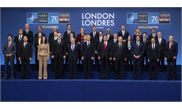
Medical workers wearing a face make and protection gear help a patient on a stretcher suspected of having COVID-19, inside the new coronavirus intensive care unit of the Brescia Poliambulanza hospital, Lombardy, Italy on Tuesday. Photo: AFP
Now that Europe is the epicenter of the global coronavirus pandemic, how it copes with the outbreak is crucial to the global fight against the virus.Since the beginning of the outbreak, the EU has adopted some prevention and containment measures, including activating the integrated political crisis response mechanism, establishing a crisis coordination committee, and channeling EU funds to mitigate the impact brought about by the pandemic. Each EU member state has also responded to the public health crisis in its own way.
Yet these steps have failed to bring the pandemic under control. The deadly virus is still spreading rapidly in Europe. This is likely the result of several factors.
First, the responses to the coronavirus - whether the bloc as a whole or within many of the member states - have largely been based on their past experience in dealing with other infectious diseases. Policymakers lacked awareness of just how highly contagious the coronavirus is and how fast it can spread, resulting in belated and ineffective actions.
Second, the mechanisms the EU and many European countries have set up to fight the pandemic have been flawed, showing their lack of experience in coping with such a major public health crisis. The bloc leadership can only offer advice to its member states, but it can't dictate what actions they would take. Each state government alone has the power to decide how to handle the outbreak, which is influenced by their national policies and medical capabilities. This means the measures EU members have adopted vary greatly, and this has affected Europe's fight against the virus as a whole.
Third, the pandemic is a major test of Europe's solidarity and administrative capacity. Regrettably, in tackling the pandemic, each country has gone its own way and is looking after only its own interests.
When Italy became the hardest-hit European country, other EU members were slow to respond. China was among the first to jump to Italy's aid. Several EU countries have closed borders and restricted exports, and some even had diplomatic spats over medical supplies.
Fourth, many European countries' decision-making has been slowed by their struggles to balance stringent measures with public freedoms and their central government's authority over local authorities. There remains a gap between their measures and the rapidly developing epidemic situation.
If the current trend continues, the outbreak in Europe may continue to spread. It's hoped the rest of Europe will learn from Italy and Spain and take more stringent steps.
The pandemic will have far-reaching effects on the EU and relations between member states.
Each EU member is likely to strengthen their national laws and regulations. In combating the virus, European citizens' interests are most directly affected by their own countries' policies, not the bloc's. Citizens will come to expect better protection from their own government in the future. It's also possible Europe will see the rise of greater populism and nationalism.
EU member states have been deeply involved in European integration, and with their interests intertwined, decoupling is all but impossible. Smaller European countries might find it difficult to handle similar crises on their own and will be eager for European cooperation. While some countries may strengthen their individual capability, they are also likely to promote further EU integration. The pandemic may drive EU reforms, pushing the bloc to reflect on its flaws and enhance its crisis management mechanism.
Against the background of globalization, the pandemic has posed a severe challenge to all countries and might impact Europe's understanding of global and regional governance.
The EU has had good cooperation with the World Health Organization and with China, while conflicts with the US have increased. The US has long identified China as a threat and attempted to cozy up to Europe in an attempt to contain China. After the pandemic ends, I believe Europe will realize China poses no threat, and the two sides have a lot of room to cooperate.
In this age of globalization, challenges faced by one country might turn into global ones. All members of the international community should work more closely. The China-proposed idea of a global community with a shared future is a great answer to emerging ideas on international relations, and I believe Europe will gradually see this too.
The author is a research fellow at the China Institutes of Contemporary International Relations. opinion@globaltimes.com.cn

